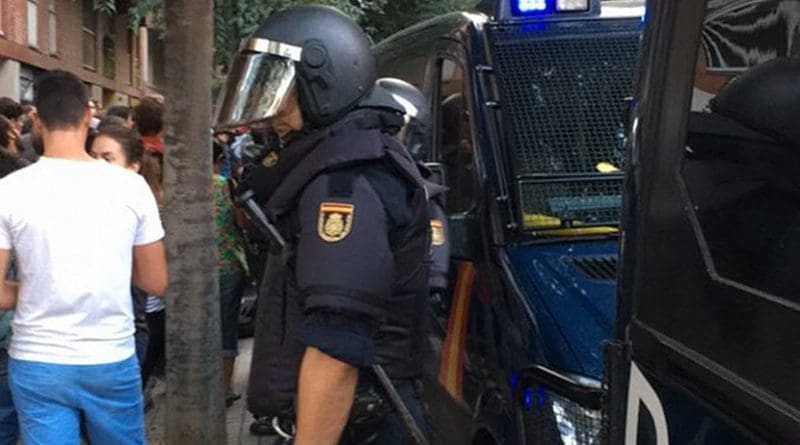Catalan Clashes Expose Usual Splits In Balkans
The heavy-handed attempts of the Spanish police to stop a Catalan referendum on independence on Sunday from taking place exposed predictable divisions in the Balkans.
By Maja Zivanovic, Ana Maria Luca, Perparim Isufi and Sven Milekic
While some politicians who support regional autonomy in the Balkans have come out in support of the Catalan referendum, most national governments – wary of separatism in their own countries – have lined up behind Spain.
Supporters and opponents of Catalonia’s right to hold an independence referendum from Spain have emerged on forseeable lines in the Balkans.
Nenad Canak, head of the League Social Democrats of Vojvodina, LSV, a party that advocates more autonomy for the northern province of Serbia, said his party supported the Catalans’ right to stage a vote on independence.
“Catalan citizens must have the right to vote in the referendum according to the constitution of Spain,” a written statement on Sunday said.
He underlined that if the referendum showed that a majority sought the independence of Catalonia “it is necessary to start a public debate within Spain on amending the [Spanish] constitution”.
On the day of the Catalan referendum, LSV supporters hung the flag of Catalonia in several towns in Vojvodina.
On the night between Saturday and Sunday, another movement, Young Vojvodina, painted graffiti saying “Catalonia = Vojvodina” in several towns in Vojvodina.
While the LSV demands more autonomy for Vojvodina, Serbian nationalists see this as a threat to the country’s unity and often call it a “separatist” party.
The far-right Serbian League issued a press release calling the pro-Catalan graffiti “a separatist and criminal act”. In a “message to all separatists”, it said: “Vojvodina is Serbia, never Catalonia.”
Serbian Foreign Minister Ivica Dacic, and the head of the Serbian Office for Kosovo, Marko Djuric, on Sunday said Serbia supported the sovereignty and integrity of Spain.
Dacic recalled also that Spain was “great friend of Serbia” and that it had not recognized the independence of Serbia’s former province of Kosovo. [Spain is one of five EU states that have refused to recognise Kosovo.]
Despite the obvious comparisons being drawn internationally between Catalonia and Kosovo, politicians in Kosovo itself have proved reluctant to get involved.
President Hashim Thaci, in a statement for Spanish news agency EFE, back in June 2016, rejected the comparison between the Kosovo and Catalan movements for independence, adding that Spain should recognise Kosovo as an independent state.
On Sunday, Kosovo leaders remained very quiet. “The Kosovo Government does not comment on the internal developments of other countries,” Halil Matoshi, head of Prime Minister Ramush Haradinaj’s Information Office told BIRN.
On Sunday, the Croatian Foreign Ministry advised its citizens to avoid visiting Barcelona and other cities in Catalania like Tarragona and Girona. It also advised Croatian citizens to avoid large public gatherings and to listen to the instructions of the local authorities, while informing themselves of the developing situation from different sources constantly.
Despite the ministry’s advice, high-schoolers whose trip to Barcelona was cancelled in late August due to the terrorist attacks in the city, are leaving for Catalonia in the following days.
Science and Education Minister Blazenka Divjak wrote on Facebook on Sunday that schools should submit lists of pupils going on the trip to both the Education and Foreign Ministries, as well as the Croatian embassy in Madrid.
The Croatian news site Index on Monday meanwhile drew a new parallel – between Catalonia and the western Croatian region of Istria, which strives for more autonomy and fiscal de-centralisation.
However, Ivan Jakovcic, an MEP and one of the leaders of the regional party, the Istrian Democratic Assembly, IDS, which rules the region, dismissed such comparisons.
“Istria and Catalonia are not comparable; their political positions are not comparable,” he said, clarifying that his party sought a high degree of regional autonomy, not an independent Istrian state.
Igor Crnadak, the Foreign Minister of Bosnia, which has its own problems with independence movements among the Bosnian Serbs [and Croats], in a telephone call with the ambassador of Spain on Sunday reiterated Bosnia’s support for the territorial integrity of Spain.
In Montenegro, on the other hand, which declared independence from Serbia after a referendum in 2006, some people hung the flag of Catalonia on their balconies.
Romania, which also has separatist issues regarding its Hungarian minority, and, like Spain, refuses to recognise Kosovo, did not issue any official position after Sunday’s events.
However, President Klaus Iohannis told a Spanish journalist in Estonia on Friday, while attending an EU summit, that he feared the independence referendum would not help Europe.
“It’s important for me to keep Europe united. Having parts of the European Union leave the EU through such a referendum doesn’t help anyone,” he concluded.

